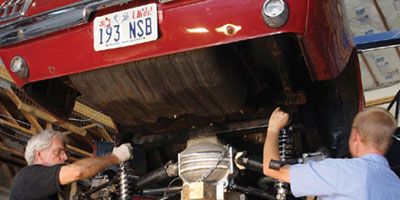
Traditional musclecars all came with live rear axles, and the sporty-car guys and clean-hands media have long used that as a reason to support their belief that stock Camaros, Mustangs, and Challengers don't handle very well. The "sophistication" of an independent rear suspension is the only way to go, or so they say. The boys in Detroit have been on the fence about it over the years, occasionally taking a stab at independent rears, such as on the '03-'04 Cobra Mustangs. Of course, as soon as guys started running fast with those cars, they grenaded the IRS. That problem was fixed on the new GT500 . . . with a solid axle. Obviously drag racing isn't their strong suit.
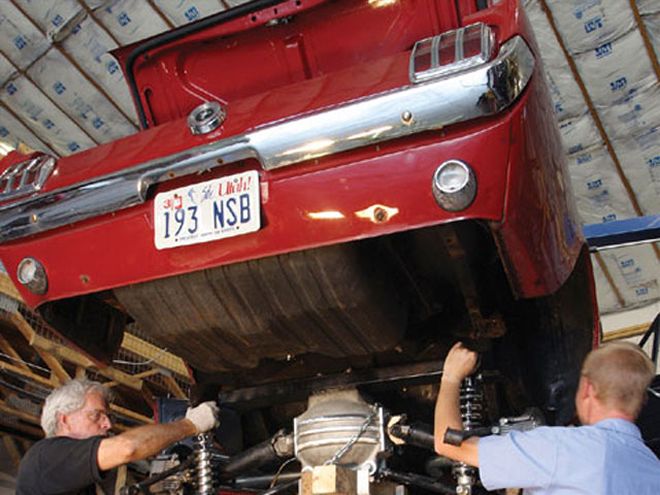 Don't think IRS belongs in a musclecar? This one does.
Don't think IRS belongs in a musclecar? This one does.
But what, really, are the pros and cons of an IRS setup in a traditional '60s musclecar? We've driven IRS-equipped musclecars before and they were impressive, but they were also pro-built cars with such extensive suspension and chassis modification that it was nearly impossible to isolate what the real benefit of the IRS was. But then again it would be silly to bolt an IRS into an otherwise stock or mildly modified car, right? Maybe not.
When we went in search of musclecar IRS systems, we discovered that so far there are only a handful of companies on the market that have developed kits that are bolt-in deals for musclecars. Each kit appears well thought out, but we were drawn to CTM Engineering's (www.mustangirs.com) because it's more than just a bolt-in IRS for Mustangs and Fords-it's the IRS that was supposed to be in them. Back in 1964, Ford engineer Klaus Arning and his team designed an IRS that would bolt directly into a stock Mustang with no changes to the car other than the addition of a few more bolt holes. Dubbed T-5 during its development, it was intended as a performance and racing option for the new Mustang. It was also supposedly the first Detroit suspension designed by a brand-new technology: the computer. Two prototype units were installed in Falcons in 1963 for testing, with the idea that the IRS would go into the new Mustang, making it the only car in its class to be so equipped. But as with a lot of things, the bean counters argued that the trick new suspension would cost too much money and that the average consumer wouldn't be able to tell the difference. In the end they won, and the suspension became the basis for several Ford race cars-but no street cars.
CTM's Duane Carling has spent the past couple of decades on a mission to track down those original plans, interviewing whomever he could until he had every source and part number identified. With original blueprints in hand, Carling re-created the innovative design with little deviation and now offers it for sale. At a starting price of seven grand, however, it ain't cheap. But does it work? After driving an early Mustang with the CTM IRS, we can honestly say we've not come across something that so completely changes the attitude of an otherwise stock Mustang.
IRS Guide
CTM's kit is currently available for Mustangs, Falcons, Fairlanes, Rancheros, Torinos, Cougars, Comets, and any other similar unibody FoMoCo product that used a leaf-spring suspension, but it's not the only game in town. If halfshafts and coilovers make you giddy, here's the roundup of other companies we found with IRS kits.
Some assembly-and imagination-requiredNot scared of a little fabrication? These companies have quality universal IRS systems that could be adapted to a musclecar.
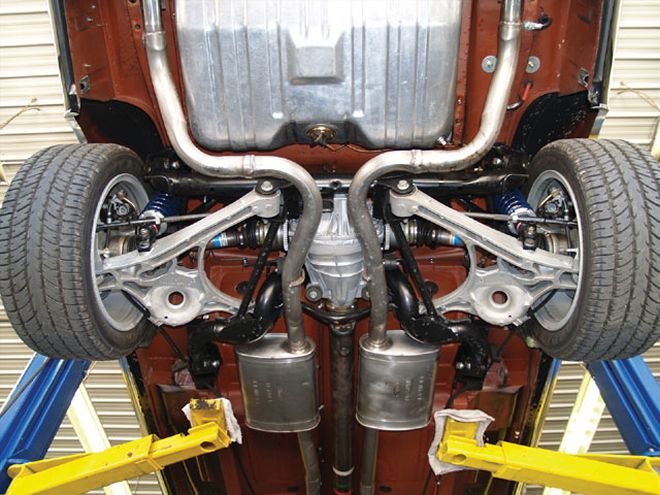
DVS Restorations
What models are covered?
'67-'70 Mustangs and Cougars
'65-'66 Mustangs (will require modifications)
What do you get?
Brackets to install a late-model Cobra Mustang IRS cradle to the framerails of the Mustang unibody chassis, special stainless steel inserts to prevent crushing the framerails, Koni coilover shocks in single- or dual-adjustable versions, Hypercoil 2.5-inch coil springs, all hardware, brake-line converters, and a 23-page full-color instruction manual.
What extras are available?
Extras include a kit to hook Cobra e-brake cables to the factory Mustang e-brake handle, optional driveshafts and mating parts, and a special lowered factory IRS cradle for additional ground clearance and the ability to drop the car 2 inches from stock.
Why should I buy it?
"Unlike systems that use expensive Jaguar or other pieces, replacement items like rotors and calipers are available from most local parts stores. Any parts manufactured for these IRS units will work with this kit [Maximum Motorsports, Steeda, SSBC,Baer, Wilwood, and so on]. The kit requires no welding and only needs 10 drilled holes to install, and it could be installed without a lift if necessary."
How do I buy it?
Directly from DVS Restorations
How much does it cost?
Base kit with single-adjustable Konis is $1,599.00; the deluxe kit with dual-adjustable Konis is $1,999.00. Cradle-lowering services are available from DVS for $350.00 plus shipping.
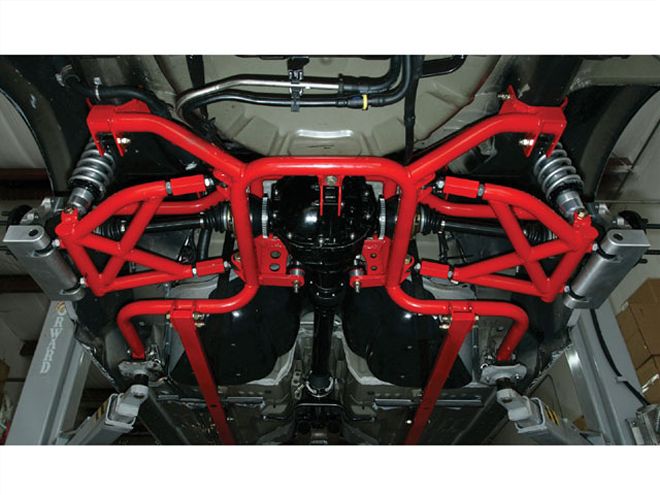
Blue Moon/Control Freak Suspensions
What models are covered?
'65-'70 Mustang
'05 and later Mustang
'67-'69 Camaro/Firebird
'70-'74 Mopar E-Body
(Tri-Five Chevy and B-Body Mopar are planned.)
What do you get?
The basic kit includes a custom IRS cage with axles capable of withstanding 650 rwhp, six-piece racing CV bearings, and Control Freak control arms. QA1 coilovers with 450-lb-ft springs are standard, and all systems have an integrated driveshaft safety loop. Centersections and brakes are all upgrades.
What extras are available?
There are three rear-wheel horsepower levels available and differing applications for street and full-race. Reinforced rearend covers and centersections are common upgrades, as well as Stainless Steel Brakes twin-piston or Tri-power brakes. Ford 8.8-inch centersections are also available. Dual coilovers per side are offered for road racing and autocross applications, and you can get airbags too.
Why should I buy it?
"We say our IRS kits are 'thick, stiff, and darn good-looking,' because they will not only improve ride quality and performance, but will also strengthen the typically flimsy unibody structure of most musclecars."
How do I buy it?
Direct or through dealers
How much does it cost?
$6,995.00 to $11,995.00, depending on options.
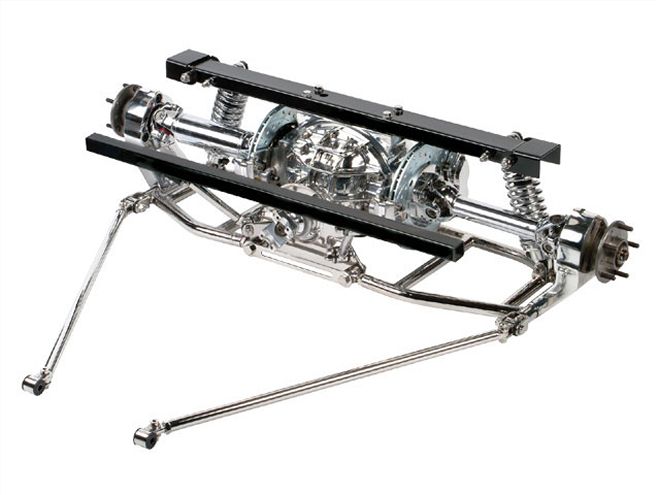
Heidt's Hot Rod Shop
What do you get?
An aluminum 9-inch housing with your choice of gears and steel halfshafts assembled with inner flanges and outer yokes, including 1350 heavy-duty U-joints, new forged inner stub axles with bearings and seals, Wilwood rotors and polished calipers, and aluminum caliper plates. Corvette outer-bearing assemblies and flanges, tubular lower control arms with adjusters, Aldan billet coilovers with chrome springs, urethane-bushed upper crossmember with outer mounting brackets, pinion-support crossmember with urethane-bushed links, and forward struts with urethane-bushed ends are also included.
What extras are available?
Multiple polished billet, stainless, and chroming upgrades, as well as posi-traction, parking-brake kit, high-horsepower halfshafts, and Ford bolt pattern on the hubs.
Why should I buy it?
"It's a complete kit hub to hub that's designed to give a smooth ride on the street, but without compromising handling."
How do I buy it?
Direct or from distributors
How much does it cost?
Complete kits start at $4,195.00.
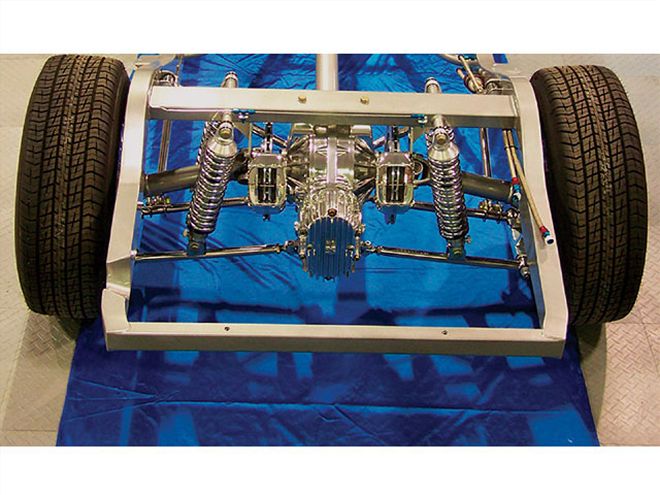
Scott's Hot Rods
What do you get?
Scott's uses either a Speedway Engineering center or a Winters quick-change with the customer's choice of gear ratio. All IRS kits come with inboard 12-inch cross-drilled and slotted Wilwood brakes with four-piston calipers and billet Aldan coilovers. The hubs are 6061 billet, but the control arms are DOM mild steel on the base kit.
What extras are available?
Each kit is made per application, so widths from 50 to 67 inches are available. Control arms can be upgraded to 111/48 -inch solid stainless pieces, and pretty much everything else can be ordered either fully polished or chromed. Coilover setups can be twin or quad, and you can also get Air Ride Technologies ShockWaves airbags.
Why should I buy it?
"Our units are made to be fully adjustable so the customer can dial in the IRS to their car. Plus they're made to hold horsepower. We have a customer who's putting 1,200 hp through one right now."
How do I buy it?
Direct from Scott's
How much does it cost?
Starts at $7,995.00.
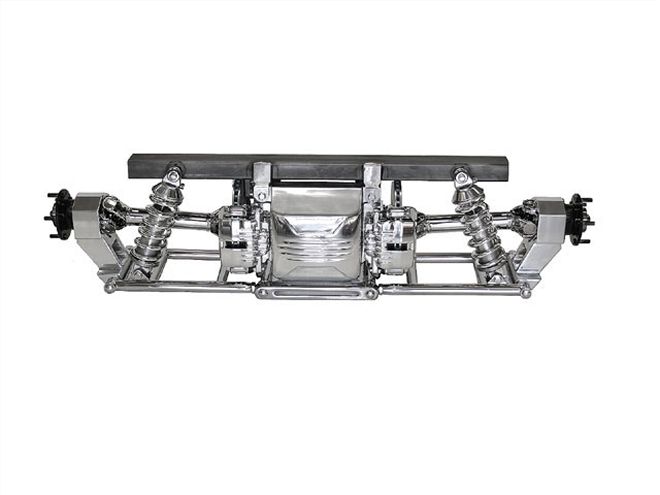
Kugel Komponents
What do you get?
The kits come fully assembled with a cast-iron 9-inch Ford centersection, Aldan coilovers, Wilwood brakes, and Corvette bearing assemblies. Halfshafts, control arms, risers, and rearend covers are custom Kugel pieces. Crossmembers are made custom per application.
What extras are available?
Centersections can be cast iron or aluminum, open or posi, or even quick-change. Kugel recommends an upgrade to two coilovers per side for heavy cars and custom-rate Eibach springs. Sway bars are also available.Custom widths are available from 52 to 62 inches in 1-inch increments.
Why should I buy it?
"Our systems have logged thousands of trouble-free miles and been under top show cars as well. It's the attention to detail that makes the difference and always using the best parts. We're not the cheapest, but there's a reason why."
How do I buy it?
Direct from Kugel Komponents
How much does it cost?
Starts at $4,995.00.
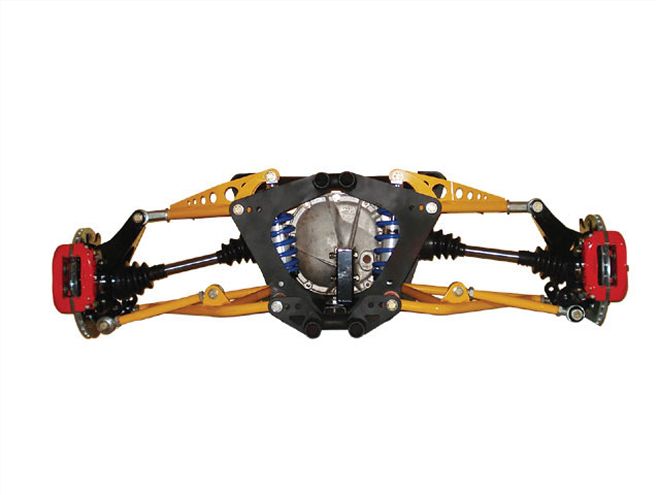
Team321
What do you get?
Team321 builds two distinctly different IRS systems. One is a full custom unit featuring a Ford 8.8 differential and inner CV joints with custom halfshafts and Corvette outer wheel bearings. The wheel bearings are available in either 5- on-4.75 (Chevy) or 5-on-4.5 (Ford) bolt patterns. The tubular upper and lower control arms feature polyurethane bushings and mount custom-fabricated spindles. The secondary IRS is actually a set of adapters that mount a Ford T-bird or Lincoln Mark VIII IRS unit in classic Ford or Chevy pickup trucks. Check out www.truckirs.com for the details on that one.
What extras are available?
Wilwood calipers and rotors in 11.75-, 12-, and 13-inch diameters, your color choice of powdercoated finish, and an aluminum differential case.
Why should I buy it?
"The custom IRS units have a unique in-board coilover design that has improved geometry over Vette- or Jaguar-based IRS units, and you can specify track width and choose from several configurations. Team321 is not a high-volume manufacturing group, rather a small company focused on each customer's unique IRS needs."
How do I buy it?
Directly through Team321
How much does it cost?
Base price is $2,700.00 outfitted with brakes, a differential, and axles. The price climbs to about $4,000 for the custom units. Adapters for the classic truck kits are $395.00.